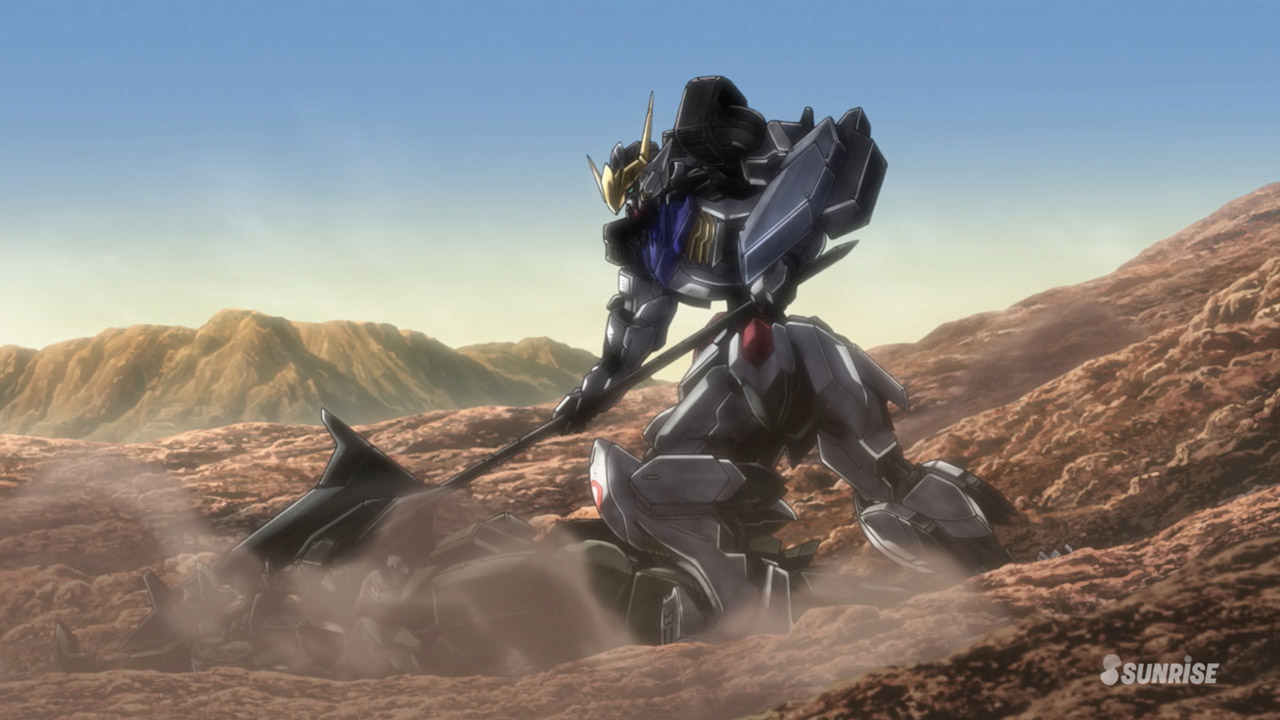Mobile Suit Gundam: Iron-Blooded Orphans is a show that many at Toonami Faithful wanted to see on the air. Fans have been dying for another mecha series after the departure of Gurren Lagann, considering the genre’s history on Toonami. It feels like those type of series belong more regularly than they have been. Now in comes Iron-Blooded Orphans to the block, with plenty of hype within the Gundam and anime aficionados. Since it began simulcasting many have enjoyed what they have seen so far, and an English dub was confirmed to be in the works. All that made it all too clear that it’d be on Toonami (especially due to the push fans gave it). Toonami did just that, making a deal with Sunrise to air it on Saturday nights. Fans were thrilled that the Mobile Suits would return. However, now that we are 12 episodes in, the initial thrill has turned to a mixed reaction. The negative noise makes me wonder what has happened to the fans’ early enthusiasm for the show and why there seem to be more complaints about it.
Let me begin by stating that this has NOTHING to do with the show’s ratings. While it has typically scored fewer viewers than Dimension W, I don’t think that fan skepticism can be confirmed simply by checking out the weekly ratings. There are a ton of factors that play into why that is the case. Factors such as Toonami moving up to 11:30 p.m., the fact that it’s the summer time (where people are on vacation or out at camps), that Iron-Blooded Orphans has been bumped down by the acquisition of One-Punch Man, the Summer Olympics— the list goes on. While Dimension W has held a lead in total viewing numbers, it didn’t have as much competition as Iron-Blooded Orphans. These viewing numbers could mean that FUNimation should be congratulated in getting Dimension W on the block when they did. Some can argue that the difference might be because Dimension W is a better show, but I’ll leave that for others to debate (for now).
Given the initial demand for Iron-Blooded Orphans, what are the main complaints about the series? The first issue appears to be the long drawn-out pauses in between action sequences. Some fans express their displeasure about how this show is more talk than action. I can’t argue against that, since there are a lot of speeches, and I would call Gundam Iron-Blooded Orphans rather dialogue-heavy so far. I’m sure fans can tolerate an episode or two where the main characters regroup and discuss strategy, since there is a war going on. Groups like Tekkadan need to communicate to make sure they are ready for an upcoming battle. But when an entire episode is nothing but discussions, it can leave fans feeling bored. Iron-Blooded Orphans needs more action to keep the interest of fans watching late at night.
I also believe that the action sequences is another reason why some fans are frustrated. A lot of the fights have a great payoff, including the drama and battle moves. Iron-Blooded Orphans does provide some spectacular action scenes which are fun, energetic, and wonderfully animated. I especially enjoyed the battle between Mikasuki and Lafter before Tekkadan became “brothers” with Teiwaz. But with the fights being so few and far between, fans begin to crave more action. Instead of a rush of excellent action, viewers are given more dialogue, which often seems pointless. Examples that include Kudelia wishing she was more useful, or Eugene on how he wants to meet a woman. I don’t mind these types of conversations in a series, but they’d be more palatable if these monologues happened along with some action, or if they were less frequent.
https://www.youtube.com/watch?v=dcUmrhtqT2o
There also might be more negativity sent Iron-Blooded Orphans’ way because of Mari Okada’s (Iron-Blooded Orphans‘ head writer) involvement in the project. That’s a name many anime fans have an opinion about because of the projects she’s been a part of (like Toradora! Black Butler, Vampire Knight, and Blast of Tempest). Last season her anime was right in the cross hairs with critics, thanks to The Lost Village and Kiznaiver. They were both heavily talked about during that time, and the conversations reached polarizing levels about how both stories were developing. For Kiznaiver, many took issue with characters giving long, overly dramatic monologues that didn’t mean much, as well as poor pacing decisions*. I found it to be a fascinating show, but for others (like colleague Jim Nelson), it was unbearably dull and slow. Okada’s work certainly doesn’t have an approval rating of one-hundred percent making me believe that Iron-Blooded Orphans would get the same treatment as some of her other projects among fans.
Despite all of that, I would argue that some of the dialogue-heavy episodes are necessary due to the character growth (and potential character growth) we see from the child soldiers of Tekkadan. They have been intriguing to watch, especially Orga’s. It’s important to note that he (and the rest of the group) are children who only know about fighting, killing, and surviving. It’s what they were bred to do. Now after the revolt on the CCG brass, Orga has to learn how to be an effective leader and find out how to become human again. Then he’ll have to help guide his men to do the same, which isn’t easy. Orga has to learn about negotiating and talking to regular civilians and so far it’s been enjoyable to watch him learn. Orga’s not perfect, but that’s the beauty of watching him grow up before our eyes. He’s trying, and the payoff of him becoming a real leader keeps me excited about the rest of the series. I also hope that the other characters follow suit (like Akihiro has recently) because it’s only been Orga who has grown since the start of Iron-Blooded Orphans.
For those who are hoping that this series ends after 25 episodes, they might want to look away now. It’s confirmed that the second season of Iron-Blooded Orphans will be produced and premiere on Oct. 2. So it could mean that this show will be on Toonami for an even longer period. I can understand that parts of the series can be boring, but there’s more to a good show than non-stop action. The show does move at a snail’s pace, which is not really what Toonami fans want. And it’s also true that even during some of the fights, there is also a lot of talking going on. All that aside, I think that it has been a solid addition to the lineup. Gundam itself isn’t the biggest draw that its fans wish it would be, so it probably was over-hyped to begin with. Hopefully, Iron-Blooded Orphans can create a few more fans of the franchise and make Gundam a little more popular than it is. But if it doesn’t happen soon, the negative buzz might work against Iron-Blooded Orphans in the future.
*Last summer I watched Kiznaiver, while I did not watch The Lost Village.
C.J Maffris is an editorial writer for toonamifaithful.com. He is still raising his flag every Saturday. Feel free to debate all things Toonami and Iron-Blooded Orphans with him on Twitter @SeaJayMaffris

